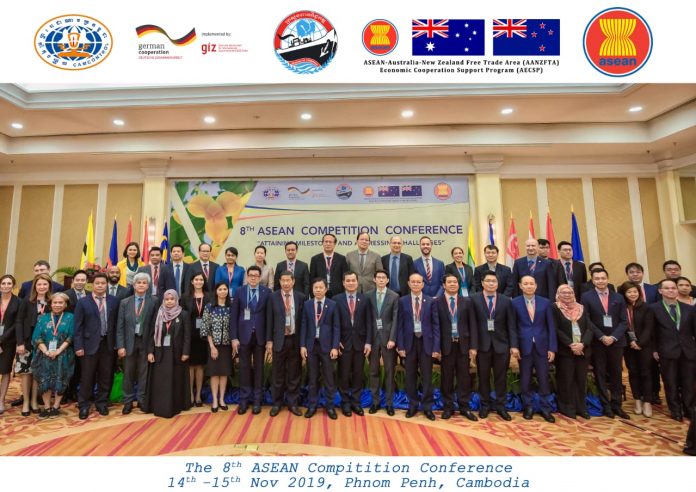JAKARTA, 18 November 2019 – The 8th ASEAN Competition Conference (ACC) took place from 14-15 November in Phnom Penh, Cambodia to discuss emerging competition issues, share best practices, as well as provide a platform for discussion and networking among competition-related authorities and stakeholders.
This year’s conference theme, “Attaining Milestones and Addressing Challenges,” brought together competition experts, academicians, and businesses.
The Minister of Commerce of Cambodia Pan Sorasak stated in his opening remarks that the conference took place at a momentous time as most of ASEAN Member States (AMS) have competition laws in place, whilst Cambodia is in the final phase of developing its own competition law.
He added that the 8th ACC is convened to celebrate the efforts of all AMS in drafting and implementing their competition policy, and provide an opportunity for all AMS to address the potential future challenges and enhance the competition landscape in ASEAN.
Minister Sorasak further reiterated Cambodia’s commitment to enact its competition law by early 2020, following the recent adoption of the e-Commerce and Consumer Protection laws of Cambodia. Together, the laws will play a vital role to support its national trade and promote consumer welfare.
In his remarks, Deputy Secretary-General of ASEAN for Community and Corporate Affairs Michael Tene highlighted, “ASEAN has come a long way since the establishment of the ASEAN Experts Group on Competition (AEGC) in 2007, as a dedicated body to cooperate on competition policies and issues.’’
He added, ‘’the AEGC has made significant stride towards ensuring a more level playing field for businesses by facilitating the enactment and enforcement of competition laws, strengthening the capacity of competition authorities to detect and investigate anti-competitive conducts, and inculcating a fair business competition culture.”
Tene also touched on ASEAN’s commitment towards maintaining a level-playing field for businesses in the region remains steadfast if not strengthened. To date, nine competition laws are in place in ASEAN, four new competition commissions have been set-up, while existing ones have been strengthened and given new mandates since 2015.
As a result, the number of competition enforcement activities are on the rise. This has been made evident by the number of preliminary enquiries and in-depth investigations conducted, the number of decisions issued and completed appeals, the number of market studies undertaken, and the number of advocacy and outreach activities conducted.
Zairan Ishak, Chair of the ASEAN Competition Enforcers Network, stated that the ACC has been a flagship event of the AEGC since it was first convened, having raised public awareness and support for competition policy in ASEAN.
He mentioned that competition law has become even more pertinent with the rise of the digital economy, causing all policy makers to question whether existing competition policy and law is sufficient to deal with such challenges.
The ACC is catered to the differing stages of competition regimes within the region, in particular the young competition authorities with significant political and operational challenges. The topics ranged from competition advocacy, detecting and investigating cartels, managing state-owned enterprise, as well as strengthening regional cooperation and the digital economy.
In addition, the results of the first competition self-assessment exercise by competition authorities was presented. Competition authorities also step forward to deliberate on the recent Grab-UBER acquisition which impacted several jurisdictions in the region.
The conference was co-organised by the ASEAN Secretariat, the AEGC and the Ministry of Commerce of Cambodia, and jointly supported by Deutsche Gesellschaft für Internationale Zusammenarbeit (GIZ) GmbH, and the ASEAN-Australia-New Zealand Free Trade Area Economic Cooperation Support Programme. The 9th ACC is scheduled to be convened in 2021.
###


